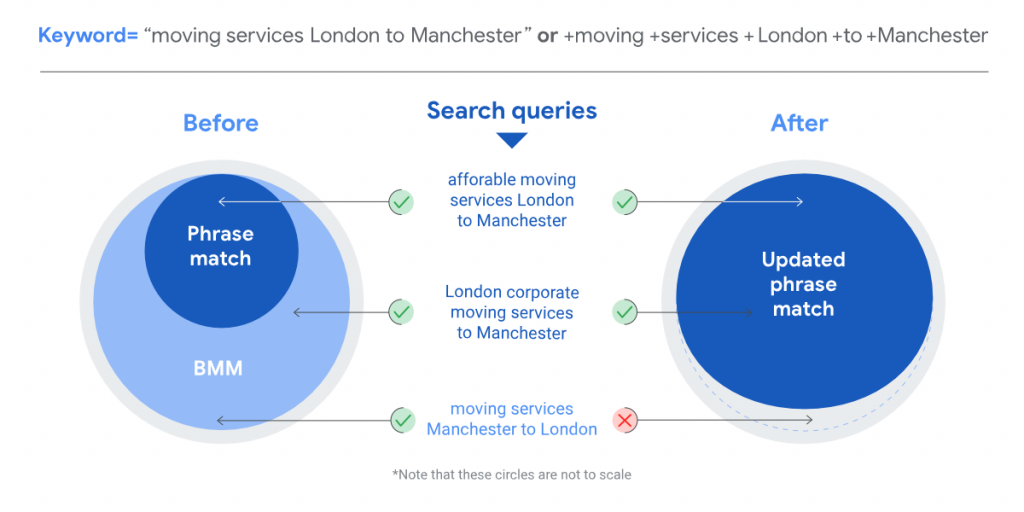You may have heard the news earlier this year that Google made the move to transition and update the behaviour of phrase match in Google Ads. The new behaviour meant that phrase match expanded to include the traffic from additional broad match modifier searches, with broad match modifier support coming to an end.
This transformation meant that advertisers could now obtain more traffic through phrase match from relevant user searches without having to worry about appearing for some of the potentially irrelevant searches that broad match modifier behaviour could sometimes generate.
Google used the example keyword of “moving services NYC to Boston” to demonstrate the change. Previously, utilising the older phrase match behaviour in conjunction with broad match modifier meant that ads could potentially appear for users who were searching for “moving services Boston to NYC” which could have been an irrelevant ad to the user in question. The new version of phrase match continues to respect word order when it’s important to the meaning of a search, but also allows for variations (such as the addition of “corporate” or “commercial” in Google’s example).

The updated phrase match meant that additional searches with added keywords could generate traffic for the ad whilst ensuring that they don’t appear for irrelevant searches (such as a moving service that would be required to travel in the opposite direction to what the user is actually searching for). Overall, this would mean more high-quality traffic for advertisers and businesses with more relevant search intent.
Microsoft have recently announced that they are going to be treating their phrase match behaviour in the same way that Google Ads does. This will bring both ad platforms in line with each other and provide a simplified way of managing keyword matching across the board. As mentioned above, the change will also aid in enhancing the relevancy of ads to users, and in turn creating more meaningful traffic for businesses and advertisers.
The change in keyword matching will begin in mid-May in the US for Microsoft, and will begin rolling out to other markets across the globe as of the beginning of June. Until the roll-out begins, both phrase match and broad match modifier will continue to behave using their existing definitions. This will also begin to tie in with the removal of broad match modifier later this year on both platforms. Google is planning to deprecate BMM in July this year, whilst Microsoft plan to do the same in August.
All in all, these changes will provide improvements to the efficiency of keyword management within accounts, but may require some recalibration of campaigns as the changes take effect. PPC account managers must monitor search term reports closely with the phrase match keyword type and add negative keywords when appropriate to maintain account efficiency and improve performance. We recommend negative keyword lists being produced to allow for efficient management in your account.
[showmodule id=”3238″]
Overall, this simplification and streamlining change provides businesses with an intuitive way to begin utilising both platforms simultaneously to maximise the visibility of their brand. If you’d like to find out how effective PPC management could benefit your business, contact us today.




























